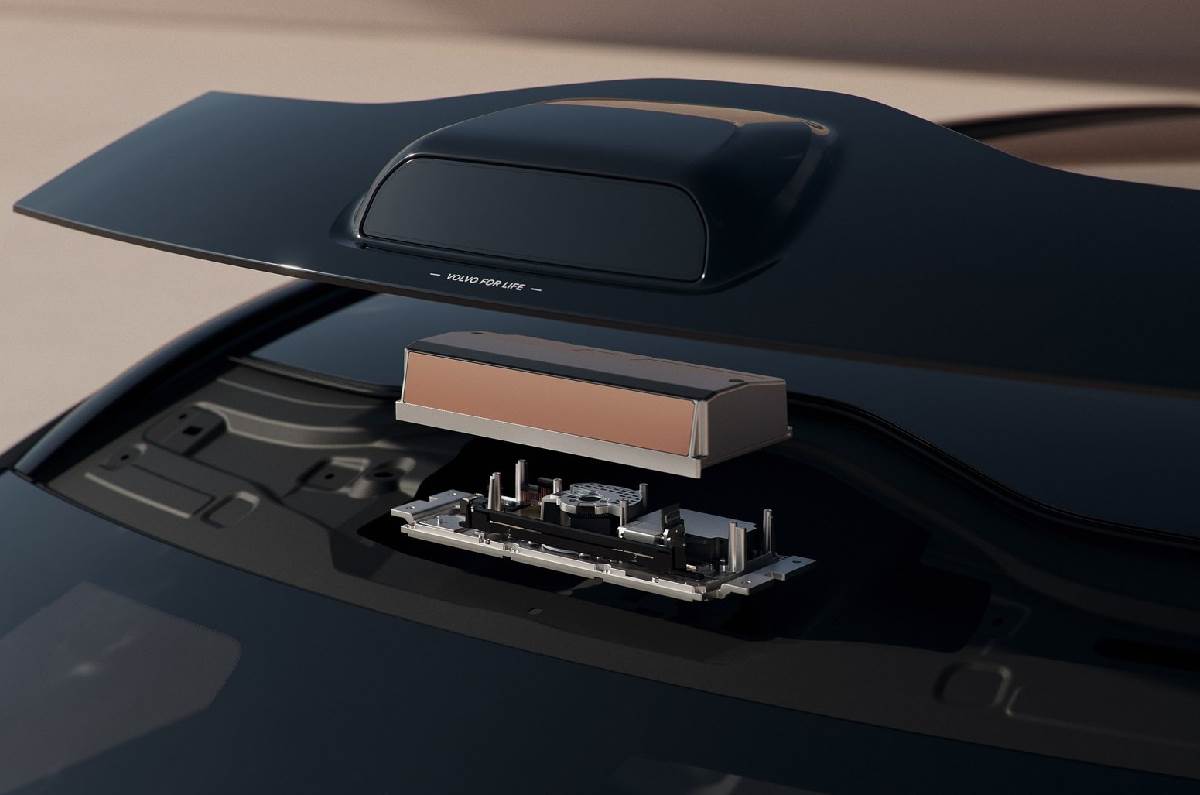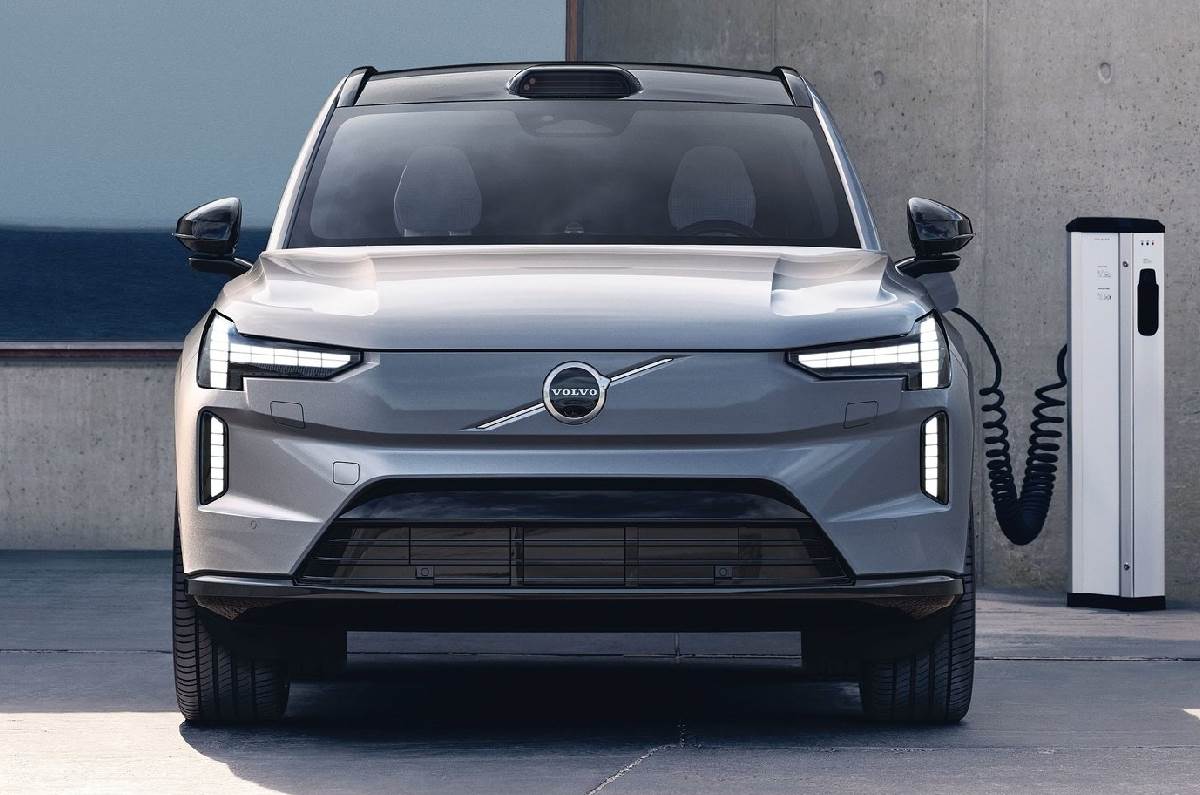Volvo says the EX90 is its safest car ever, being equipped with its host of safety features, including Lidar as standard.
Volvo has revealed the new all-electric, seven-seat EX90 SUV as the brand’s new flagship. Due to go on sale globally in 2024, the new EV SUV is effectively an electric-only equivalent to the existing Volvo XC90.
- EX90 SUV is Volvo’s third electric model
- Promises a range of 600km, WLTP cycle
- Supports bi-directional charging
It is the third electric model from the Swedish brand after the XC40 Recharge and the C40 Recharge, It is, however, the first to be underpinned by a dedicated EV SPA2 architecture. It is closely related to the recently revealed Polestar 3, but unlike it, the EX90 has three-row seating.
Volvo EX90: exterior design and dimensions
In terms of the design, the EX90 is based on the Concept Recharge which was shown last year and is more of an evolution compared to the current XC90 SUV. The EX90 retains the familiar Volvo design cues like the Thor’s hammer headlights and the blanked-off grille seen on the XC40 Recharge.
From the profile, it features flush door handles and sharply styled 22-inch five-spoke alloy wheels. There are some creases along the side but what looks similar to the XC90 is the large glasshouse. From the rear, it gets a rather unique split tail lamp design with a C-shaped LED-unit below and a pixelated pattern for the unit above. In terms of dimensions, at 5,037mm, the EX90 is slightly longer than the XC90. It is also wider, but slightly lower than the XC90.
The design of the EX90 has been honed for aerodynamic efficiency to optimise the range and Volvo claims that it has a drag coefficient of 0.29Cd.
Volvo EX90: interior design and features
The stand-out feature on the inside is the large 14.5-inch vertically oriented touchscreen that features Volvo’s Google-based infotainment. The EX90 features a 5G connection as standard to aid over-the-air updates. At the moment, the EX90 is offered only with the top-spec Ultra trim which gets equipment like a panoramic sunroof, 25-speaker Bowers & Wilkins audio system featuring Dolby Atmos and speakers integrated into the headrests. The EX90 also comes with phone key technology as standard where the smartphone serves the function of the key for the car.
The interior is finished in Nordico upholstery – a textile made from recycled materials including PET bottles and corks – and features extensive use of natural materials. Overall, Volvo says that the EX90 contains 15 percent recycled steel and 25 percent recycled aluminium, along with around 48kg of recycled plastics and bio-based material – about 15 percent of the total plastic used in the car.
Volvo EX90 EV: onboard safety tech
Volvo says that the new EX90 is the safest car they have ever built. A major focus has been on safety features, both software and hardware that underpin the SUV. Most notably, it will feature Lidar (light detection and ranging) as standard with the sensor mounted on the front edge of the roof. That will work in sync with a host of other interior and exterior sensors and cameras to power advanced driver assistance and safety systems.

The EX90 gets Lidar with roof-mounted sensor.
Initially, that will include an upgraded Pilot Assist system, and a steering support function that will help change lanes. Volvo says the systems will eventually offer an over-the-air subscription update that will offer “unsupervised autonomous driving” in certain conditions and places. The interior sensors can gauge eye concentration to warn about driving while distracted or drowsy.
The new safety kit, along with the EX90’s infotainment and battery management systems, will be powered by a core software system that uses advanced Nvidia Drive platforms along with Qualcomm’s Snapdragon Cockpit platform mixed with in-house Volvo software.
Volvo EX90 EV: powertrain, battery and charging
The EX90 will initially come with a twin-motor, all-wheel drive powertrain with two levels of output. The Twin Motor models will get 408hp and 770Nm of torque, with Performance models offering 517hp and 910Nm of torque. Both the models will have a limited top speed of 180kph. Lower powered single-motor versions are likely to follow later.

The EX90 can charge from 10 to 80 percent in less than 30 minutes.
Power is drawn from a 111kWh battery delivering a range of 600km (WLTP cycle). The EV SUV supports fast charging and it can charge from 10 to 80 percent in under 30 minutes.
The EX90 will support ‘Plug and Charge’ which, when launched, will automatically start charging the machine and sort payment when it is plugged into a compatible charger.
Additionally, it will get bi-directional charging, allowing it to send power to a home through a bi-directional wall box. That service will initially be offered only in select markets.
Volvo EX90 EV launch details
Production of the Volvo EX90 will begin in the firm’s plant in Charleston, USA late next year, with manufacturing at the firm’s Chengdu, China plant following at a later date. Volvo says it is aiming for manufacturing at both facilities to be climate-neutral by the time production starts.
Volvo has committed to becoming an electric-only brand by 2030 and says that the EX90 is the first of one new fully electric car that it will launch each year to reach the goal. The firm hasn’t confirmed what will follow the EX90, but it is known to be working on an entry-level SUV to sit under the XC40, and an electric equivalent of the current XC60 will likely also be a priority.
Volvo’s EV plans for India
Volvo recently decided to phase out existing plug-in hybrid electric vehicles (PHEVs) in favour of EVs. In India, the Swedish carmaker aims to launch one EV every year, with the carmaker launching the XC40 Recharge this year and the launch of the C40 Recharge slated for next year. The EX90 is expected to come to India sometime in 2025.
Also see:
Volvo XC40 facelift with mild hybrid powertrain launched at Rs 43.20 lakh

